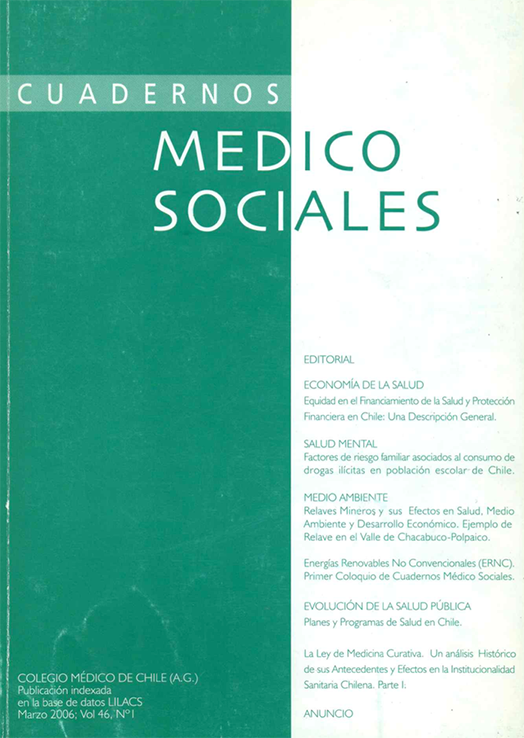The Curative Medicine Act for white collar workers: a historical analysis of its background and its consequences in the Chilean Health Care System.
Keywords:
Health Care System institutions, social subjects, health reform, solidarity principle, unified national health fund, exclusions, medical corporation, payment per service, service order-check, copaymentAbstract
By means of a historiographical analysis we show how the development of the Chilean Health Care institutions has always been strongly conditioned by deep contradictions among class, group and social subjects interests, in the stage of our national political activity and within the framework of international events. The 1924 Social Security Act finally developed into the National Health Service (NHS) and Social Insurance Law of 1952, after a long process started during the Popular Front government, at the end of the 1930´s. In spite of its being a step forward in the history of Chilean Social Policy, the 1952 Act retained some restrictive characteristics and shortcomings: these created the conditions for the resurgence of liberal medicine, which was anticipated by the Curative Medicine Act for white collar workers, of 1968, and was later consolidated by the military dictatorship which took over in 1973. The origin, political motivations and complex discussion of this Act up and until its approval in 1968 and that of the corresponding Regulatory Decree, 1969, are analyzed. A detailed review of the official journal (Revista Vida Médica) of the Chilean Medical Association, 1954- 1970, has allowed us to follow the social and political course of the interests of the medical corporate body, with its contradictions between the doctrine of socialized medicina of the 30’s, on the one hand, and the market expectations born in the 50’s, on the other hand. The latter became dominant and this explains the enactment of the Curative Medicine Law, which introduced into the NHS and related public health institutions the categories, practices and instruments that properly belong in the private commercial relationships which prevail to this day in the social response to health needs. This analysis allows us to understand how the political restrictions which prevented the attainment of the national character which had been desired for the NHS, with universal coverage and financing, made possible the regressive reforms of the national health care system which started in 1968.
Downloads
Downloads
Published
How to Cite
Issue
Section
License

This work is licensed under a Creative Commons Attribution-NonCommercial-ShareAlike 4.0 International License.


